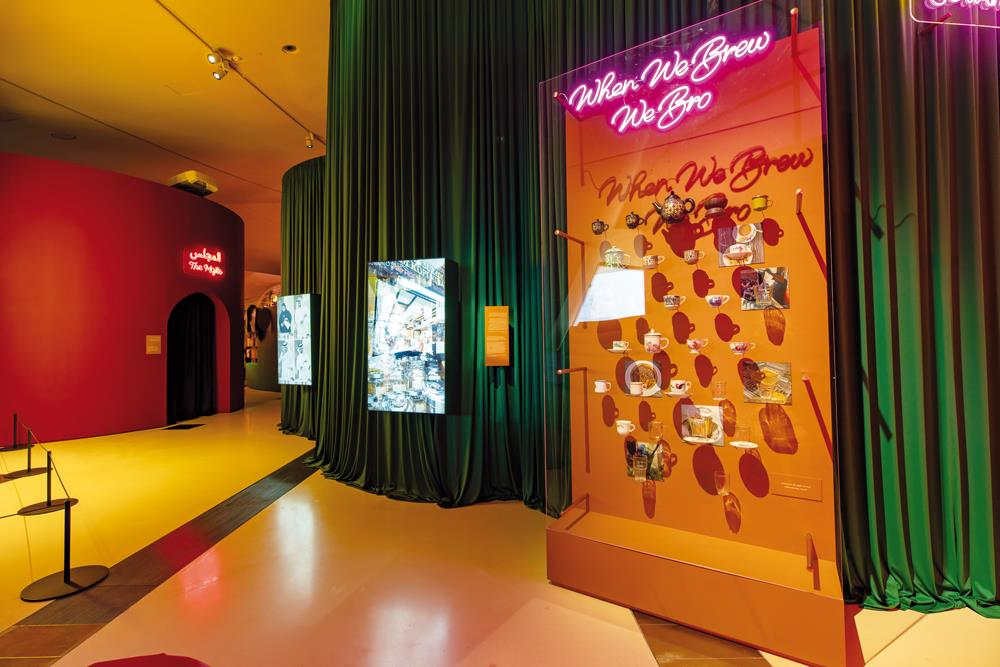
Exhibition Delves Into History Of Coffee Cultivation
Doha, Qatar: The Qatar-Indonesia 2023 Year of Culture brings one of the year's most exciting exhibitions to Doha,“Growing Kopi, Drinking Qahwa; Stories of Coffee in Qatar and Indonesia,” which was recently opened at the National Museum of Qatar.
This immersive exhibition delves into the rich history of coffee cultivation, trade, and consumption worldwide, with a special emphasis on the traditional and contemporary coffee cultures of Qatar and Indonesia.
Through interactive displays, immersive projections, sensory experiences, and a specially commissioned contemporary artwork, visitors are in for an unforgettable journey.
Read Also- 'Expo 2023 Doha unique opportunity to showcase Qatar's horticultural strides' Swedish-Qatari collaboration to expand in realm of climate action Diplomats, experts laud Qatar's advancement in arts and culture
What makes this exhibition even more special is the extensive involvement of the local community across many aspects of the exhibition. From local coffee entrepreneurs and young Qatari artists to the first-ever exhibition youth intern team,“Growing Kopi, Drinking Qahwa” embodies a spirit of collaboration and community engagement.
The exhibition teen interns from the from the Ajial Altarbwy centre, Ftaim Al Qahtani, Al Jouri Al Thani, Abdulrahman Al Qahtani, Al Mayasa Al Emadi, and Abdullah Al Meghessi filmed a unique take on the traditional qahwa-serving ritual, as well as a taste-testing video where they shared their family secrets to brewing the perfect pot of qahwa.
The exhibition also includes oral history interviews with prominent members of the community such as the owners of Flat White Specialty Coffee, Nasser Al Naemi and Maryam Al Bader, coffee expert, Mohammed Al Dulaimi and owner of Nafahat Derty, Lolwa Ali Salem who demonstrated the traditional way of making Arabic coffee.
The exhibition also highlights the sustainability initiatives led by the local community such as Rare Earth, an initiative introduced by Faisal Al Suwaidi that upcycles coffee grounds into plant pots. The exhibition's marketing campaign and videos will feature teenagers from the Indonesian community in Qatar.
Coffee rituals in this region have deep social significance, fostering connections and facilitating the exchange of ideas and information across communities and continents.
An initiative led by Qatar, Saudi Arabia, the United Arab Emirates, and Oman successfully entered Arabic coffee into the Unesco list of Intangible Cultural Heritage in 2015. Unesco said at the time,“Serving Arabic coffee is an important aspect of hospitality in Arab societies and is considered a ceremonial act of generosity.”
Qahwa bears little resemblance to the coffee found in cafes and shops. Its distinctive colour and delicious aroma are the result of added spices. In the Gulf region, cardamom, cloves, and saffron are common ingredients in qahwa recipes. Visitors to the exhibition will have the opportunity to discover the special touches added by local families to their qahwa recipes.
A short film created in collaboration with Qatari youth shows the complexity of the coffee serving and drinking etiquette in Qatar, often with humorous outcomes.
“The exhibition teen interns started preparing the content in January 2023. This is the first exhibition where we had teenagers work with us from the early stages of the exhibition-making process and we are extremely proud of all of them. They really took ownership of the two films, from getting actors to securing locations and writing the script. The exhibition also features artworks by young Qatari artist Afraa Al Kubaisi whose artwork bridged the coffee traditions in Qatar and Indonesia,” said Najma Ahmed, a Social and Oral History Researcher at the National Museum of Qatar.
The film takes viewers on a journey through customs prevalent in the Gulf region, such as the tradition of pouring coffee using the left hand for the coffee pot (dallah) and the right hand for the small cups, starting with the elderly or individuals of importance. It is customary to keep pouring coffee until the drinker shakes the cup (finjan).
“With the help of the exhibition intern team, we were able to accomplish this magnificent coffee exhibition,” said National Museum of Qatar Oral History Researcher Rawdha Al Thani.
“Black or blond, coffee is inspiring and deserves to be a perfume. For people who know and enjoy it like me, coffee is the sister of time and the drink which spreads its nice aroma in the majlis. I was happy to give my suggestions, feedback and listen to the coffee lovers' opinions, in a quiet place inhaling the pleasant odour of coffee. With a true passion for this wonderful drink, I conducted exciting interviews and supervised the production of a film with my colleagues,” said Head Curator of Oral History Amal al Haidous.

Legal Disclaimer:
MENAFN provides the
information “as is” without warranty of any kind. We do not accept
any responsibility or liability for the accuracy, content, images,
videos, licenses, completeness, legality, or reliability of the information
contained in this article. If you have any complaints or copyright
issues related to this article, kindly contact the provider above.


















Comments
No comment